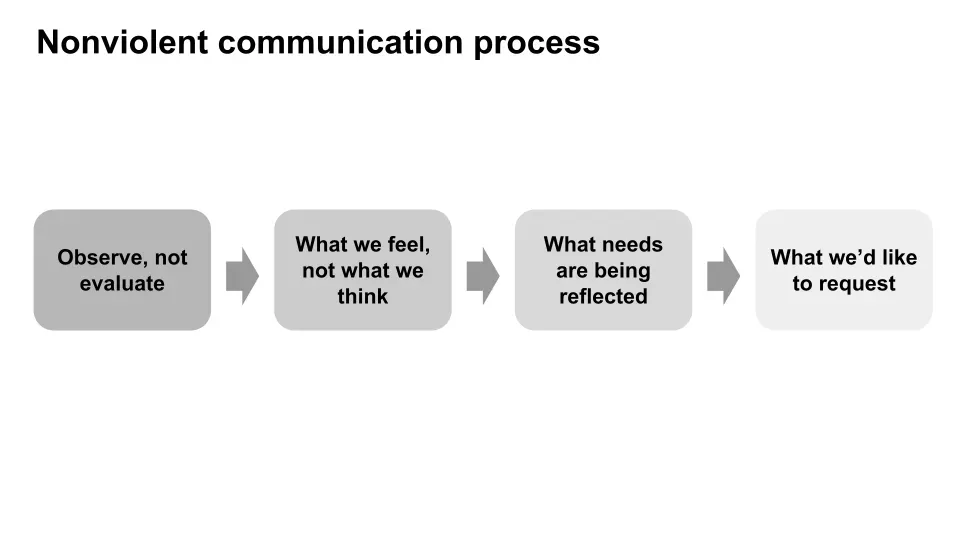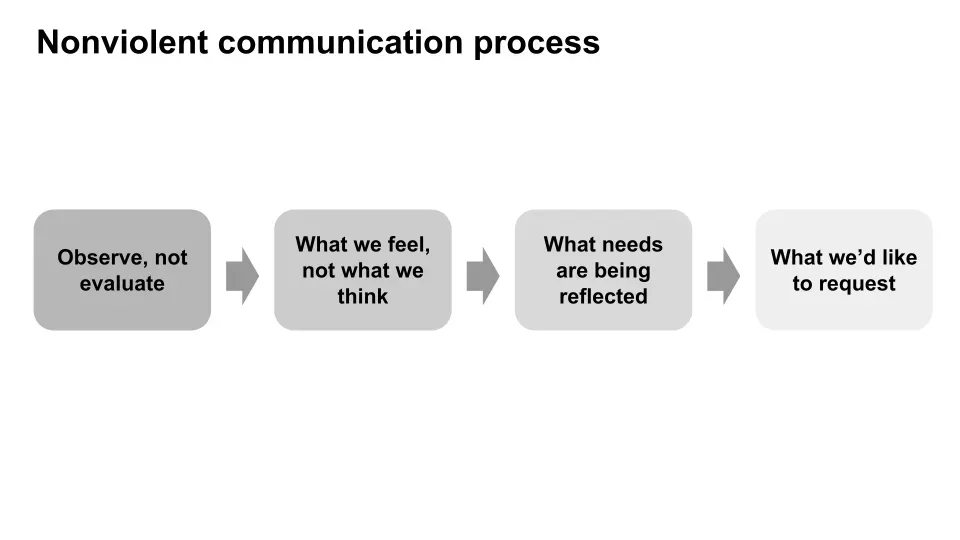Book Review: Algorithms to live by
How can we apply algorithms to improve decision making in real life?

Communicating nonviolently by observing feelings and needs will help improve relationships and reduce chances of people feeling threatened, making it more likely for everyone to get what they want.
I once unintentionally implied a friend was bad at math, and she’s never let me forget it. Makes you wonder how many people I’ve offended accidentally. For a supposedly intelligent species, we’re terrible at communicating how we feel and what we’d like others to do. We expect people to read our minds, getting frustrated when they can’t, despite being unable to do so ourselves. We could all work on better communication; it’s a neverending goal of mine.
I read about Nonviolent Communication (NVC) recently, and found it helpful in highlighting ways I could improve. NVC is focused on feelings - understanding our own, and empathising with others. By understanding these better, we can communicate without hurting others unintentionally.
The NVC process has four main steps, focused around making people feel less threatened by our language:
First step: we need to separate the observation of a fact from the evaluation of a person. When we include an evaluation, it usually sounds like criticism. When it sounds like criticism, people start tuning out. For example, saying “Jerry hasn’t scored in 10 games” is an observation, whereas “Jerry is a poor player” is an evaluation.
If you recall my summary of Thanks for the feedback, a book on how to get better at taking feedback, this should sound familiar. Getting evaluated can easily result in self-doubt about your competence. For example, someone making a suggestion at work might make you over-think and believe they’re saying you’re incompetent at your job.
And you’ve probably experienced this before - once you feel you’ve been criticised, you’re not receptive to any other comments, making that entire conversation pretty pointless. It’s like being “on tilt” when in poker and therefore making bad decisions.
Thanks for the feedback approached this from the receiver’s point of view, by asking the commenter to clarify the comment. NVC approaches this from the giver’s point of view, by deliberately separating observations from evaluations. It’s a step towards being less confrontational.
Second step: we have to understand what we’re feeling, distinguishing that from what we’re thinking. The difference can be subtle but meaningful, and is helpful for the next step. For example, “I feel unimportant” is how we think others are viewing us, whereas “I’m discouraged” is a feeling.
I’ll be writing on this more in the future, and believe that we don’t know ourselves well enough, usually having difficulty saying exactly what we’re feeling. This causes problems because we can’t figure out how to address our feelings. There was a Romantic period in the arts in the early 1800s emphasising emotion, and I believe it’s due for a comeback.
Third step: we have to understand the needs that are driving our feelings. Other people can trigger our feelings, but our own needs are the cause.
When we receive a negative communication, we can (1) blame ourselves, (2) blame others, (3) understand our feelings and needs, (4) understand the other person’s feelings and needs. NVC claims that (1) and (2) are counterproductive, and that (3) and (4) are required for meaningful communication.
NVC also made an interesting point on emotional growth, saying we move through three stages of growth. Initially, we’re emotional slaves, seeing ourselves responsible for other’s feelings.
Naturally, this is a draining position to be in. Those that realise the high costs associated with the prior stage rebel and become obnoxious, feeling angry and wanting to dump any and all responsibility. That’s still immature.
The last stage of growth is emotional liberation, where we respond to others out of compassion, and accept responsibility for ourselves but not for others. It reminds me of Kegan’s theory of adult development, which has most people stagnating at the middle stage.
Fourth step: once we know what we’re feeling and why, we can finally make requests (not demands) of others. The clearer our request is, the more likely we’ll be able to get what we desire. For example “I want you to be more responsible” is unclear compared to “I would feel happy if you did the dishes after eating”
Whether something is a request or a demand depends on the results of not complying with it. If noncompliance results in criticism or guilt-tripping, it’s a demand. When people believe they’re hearing a demand, they feel threatened, seeing only submission or rebellion as their options, neither of which are good for the relationship.
The NVC book also covers how to empathise more, express anger, and express appreciation, but I’ll leave that out to keep this succinct. I do have a concern that wasn’t addressed though - It’s assumed that everyone is acting with good intentions and can develop empathy. If I’d read this pre-pandemic, I’d be inclined to agree. Instead, I’m now wondering what’s the right approach if others aren’t acting in good faith. I don’t have any good ideas on that end - perhaps just avoid these people?

NVC’s core belief is that people need to be understood and that having more empathetic communication helps. By better understanding ourselves and others, we can improve the quality of our relationships at work and at home. I’m looking to use it moving forward to make my communications more effective and less threatening.
Get my next essays in your inbox:
Comments